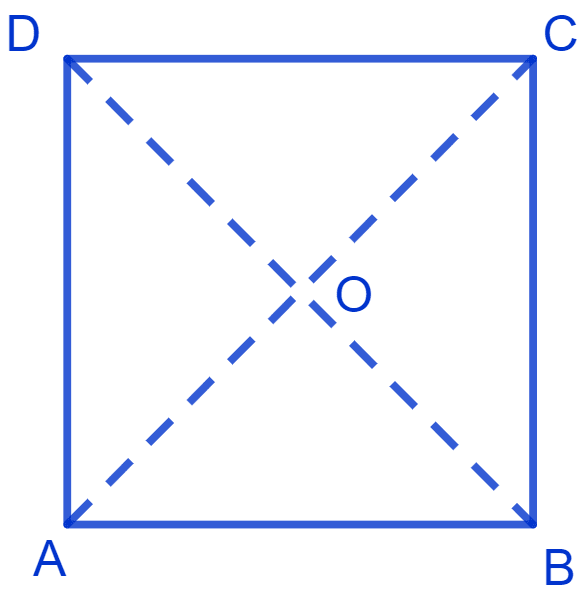Mathematics
Show that the diagonals of a square are equal and bisect each other at right angles.
Rectilinear Figures
7 Likes
Answer
Let ABCD be the square.

In Δ ABC and Δ BAD,
⇒ AB = AB (Common side)
⇒ BC = AD (Each side of a square is equal in length)
⇒ ∠ABC = ∠BAD = 90° (Each interior angle in a square is a right angle)
∴ Δ ABC ≅ Δ BAD (By S.A.S. congruence rule)
We know that,
Corresponding parts of congruent triangles are equal.
∴ AC = BD (By C.P.C.T.)
In Δ OAD and Δ OCB,
⇒ AD = CB (Each side of a square is equal in length)
⇒ ∠OAD = ∠OCB (Alternate angles are equal)
⇒ ∠ODA = ∠OBC (Alternate angles are equal)
∴ Δ OAD ≅ Δ OCB (By A.S.A. congruence rule)
We know that,
Corresponding parts of congruent triangles are equal.
⇒ OA = OC (By C.P.C.T.) ……(1)
⇒ OB = OD (By C.P.C.T.) …..(2)
In Δ OBA and Δ ODA,
⇒ OB = OD ….[From equation (2)]
⇒ OA = OA (Common side)
⇒ BA = DA (Each side of a square is equal in length)
∴ Δ OBA ≅ Δ ODA (By S.S.S. congruence rule)
We know that,
Corresponding parts of congruent triangles are equal.
⇒ ∠AOB = ∠AOD = x (let) (By C.P.C.T.)
⇒ ∠AOB + ∠AOD = 180° (Linear pair)
⇒ x + x = 180°
⇒ 2x = 180°
⇒ x = = 90°.
⇒ ∠AOB = 90° and ∠AOD = 90°.
Thus, AC and BD bisect each other at right angles.
Hence, proved that the diagonals of a square are equal and bisects each other at right angles.
Answered By
5 Likes
Related Questions
If the diagonals of a parallelogram are equal, then show that it is a rectangle.
Diagonal AC of a parallelogram ABCD bisects ∠A. Show that
(i) it bisects ∠C also,
(ii) ABCD is a rhombus.
(Ex.8.1Q3.png)
ABCD is a rectangle in which diagonal AC bisects ∠A as well as ∠C. Show that :
(i) ABCD is a square
(ii) diagonal BD bisects ∠B as well as ∠D.
In parallelogram ABCD, two points P and Q are taken on diagonal BD such that DP = BQ see Fig. Show that:
(i) Δ APD ≅ Δ CQB
(ii) AP = CQ
(iii) Δ AQB ≅ Δ CPD
(iv) AQ = CP
(v) APCQ is a parallelogram
